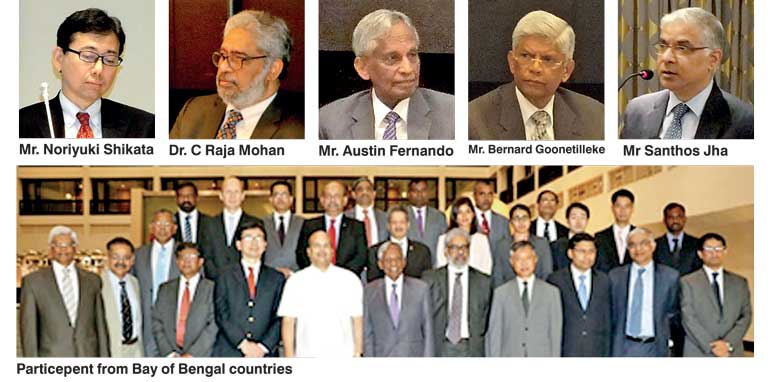Monday Feb 16, 2026
Monday Feb 16, 2026
Tuesday, 21 February 2017 00:00 - - {{hitsCtrl.values.hits}}

The Pathfinder Foundation convened ‘Trincomalee Consultations’, a two-day conference, saw the participation of the countries in the Bay of Bengal, which are dependent on the bay for their trade and other interactions.
Bay of Bengal countries India, Bangladesh, Nepal, the Maldives and Sri Lanka attended the conference while Japan and Norway are also taking part in the deliberations, held at Cinnamon Grand, Colombo.
Adviser to the President and Eastern Province Governor Austin Fernando declared open the conference, co-hosted by Carnegie India. India External Affairs Ministry Joint Secretary Santosh Jha and Japan Foreign Affairs Ministry Southeast and Southwest Asian Affairs Department Deputy Director General Noriyuki Shikata attended the event.
Among those present at the event were Pathfinder Founder Milinda Moragoda and PF Executive Director Luxman Siriwardena. The regional event, Colombo Consultations was organised by PF Centre for Indo-Lanka Relations Director Admiral Dr. Jayanath Colombage.
Following the opening session chaired by PF Chairman Bernard Goonetilleke, papers presented on the three themes of the conference by Carnegie India Director Dr. C. Raja Mohan, Abu Saeed Khan (Bangladesh), Dr. Satoru Nagao (Japan), Admiral Dr. Jayanath Colombage, Prof. Rohan Samarajiva, Rohan Masakorala (Sri Lanka) and Bay of Bengal Initiative for Multi-sectoral Technical and Economic Cooperation (BIMSTEC) Secretary General Ambassador Sumith Nakandala.
The Trincomalee harbour in today’s strategic maritime context would be ideal for functioning as a commercial hub and as a centre for regional maritime security architecture focusing the Bay of Bengal, Eastern Province Governor Austin Fernando said after the opening of Trincomalee Consultations.
“There are written and unwritten practices that have affected our economy and security, is related to the sea around us. It is common to the other Bay of Bengal countries too he add. Due to the economic and strategic importance of the Indian Ocean, the region has become an area of geo-political and geo economic competition for major powers.”
Fernando said the Trincomalee port area development has been appallingly slow and the road for investment is wide open and it is now limited to wheat milling, cement production, petroleum product development, minor fishery development and tourist service delivery.
India External Affairs Ministry Joint Secretary Santosh Jha said: “The growing consciousness of our maritime space is also directly linked to rising centrality of our immediate periphery in our foreign policy many of them being littoral states and in case of Sir Lanka and Maldives are island nations. This is reflected first and foremost in our neighbourhood first policy, which is a triangulation of fostering stronger contacts, building greater connectivity and forging closer cooperation.
“Each of the relationships in our neighbourhood has been prioritised and has progressed significantly in recent years. There is a new level of attention given to them as reflected in high level exchanges, some after a gap of several years. They have become more outcome-oriented and consultative while retaining the principle of shared prosperity and security as well as of non-reciprocity.
“Our strong intent for cooperation has been demonstrated by tackling long-pending and intractable issues such as the maritime and land boundary problem with Bangladesh. Our commitment to make available our capabilities in times of distress has been manifest in our assistance to Nepal during the disastrous earthquake, supply of water to Maldives or support extended to Sri Lanka during landslides and floods last year. Our development cooperation has also expanded both in terms of range, quality, overall quantum of commitments and pace of implementation. Most important, emphasis on connectivity as a pathway for economic progress and prosperity and for building greater trust and stability has emerged in sharper focus than before.”
The PF, in cooperation with Carnegie India and with the support of Japan and Norway, has launched the Trincomalee Consultations to focus on three broad areas: (i) Geo-strategic significance and regional maritime security demands in the Bay of Bengal, (ii) Transportation and economic connectivity in the Bay of Bengal: Way ahead for enhanced cooperation and (iii) Strategic importance and potential for development of the Trincomalee Harbour as a hub for the Bay of Bengal region.